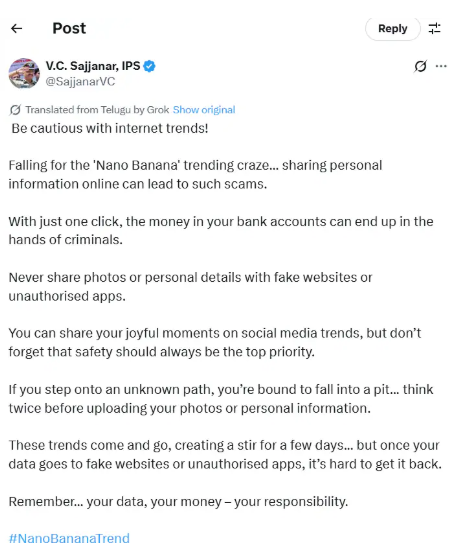Warning Issued: 'Nano Banana' Trend is a New Hunting Ground for Scammers
If you asked the Gen Z about a culture they follow hardcore, chances are they wouldn’t name an ancient civilization or a traditional custom. More likely, they would point to the ever-changing world of social media trend culture.
Every other week, a new challenge, filter, or quirky experiment makes the rounds, and of course, everyone wants to join in. And honestly, why not? Life already feels monotonous enough, so there’s no harm in people finding joy in these passing fads.
The internet’s latest obsession is proof of that. The “Google Gemini Nano Banana” trend has exploded across feeds, pulling in millions who are eager to try it out. But what sounds like a harmless bit of fun, experts are now warning, can be hijacked by scammers, and the consequences could be serious.
The Viral Trend and Its Darker Side
The trend asks users to upload their photos in exchange for an AI-powered “Nano Banana” effect, a playful, futuristic-looking filter that has quickly become the internet’s latest toy. Millions have jumped on the bandwagon, but while the craze looks light-hearted on the surface, cybercriminals have been faster than anyone to exploit it.
Instead of heading to official Google apps or trusted websites, many people are being lured into look-alike platforms that are deliberately built to mimic the real ones. Behind the scenes, these platforms aren’t just after your selfies.
They’re quietly pulling in personal information, the kind that can later be pieced together for far more dangerous ends, whether it’s identity theft, financial scams, or even highly targeted phishing attempts.
A Warning from Law Enforcement
The issue mostly got the spotlight after IPS officer V.C. Sajjanar posted on X (formerly Twitter), urging people to be cautious. His post highlighted that while the "Nano Banana" might seem innocent, it has become a new hunting ground for online scams.

Once your personal data lands on a shady website, it's nearly impossible to control where it goes next. Scammers are finding new and inventive ways to exploit this curiosity, from cloning identities to draining bank accounts.
Why These Scams Catch Us So Easily
The real danger isn't about the technology; it's about a very human impulse: trust. In the whirlwind of viral trends, we're all in a hurry to join in. We see something cool our friends are sharing and, without thinking, we click, sign up, or download. Scammers are very well aware of it, and that’s the urgency they exploit.
In the rush to join in, we skip these small but crucial steps that keeps us safe. We don't bother to check the URL for a typo, or we just click "agree" on app permissions without a glance. That tiny moment of carelessness is all a scammer needs to turn our curiosity into a costly mistake.
How to stay safe when everyone else is doing it
You don’t have to sit out the latest trend just to stay secure online. The trick is to build small habits into the way you interact with apps and links.
Start by going straight to the source. If a trend claims to be backed by a company like Google, don’t rely on the link that popped up in your WhatsApp group or Instagram DM. Open the Play Store or App Store yourself and search for it. Take a moment to check the developer’s name, it should match the official company, not some random account with a look-alike title.
Links are another common trap. A forwarded URL might look harmless, but pay attention to the details. If the address is full of odd characters, misspells, or long strings of numbers, it’s usually best to avoid clicking. You’ll be safer typing the trend’s name into a search bar and finding the official page on your own.
It also helps to pause before jumping in. A trend flooding your feed doesn’t automatically mean it’s safe. A quick search, something as simple as “Nano Banana scam”, can tell you if people are already raising concerns. That extra step takes seconds but can save you from headaches later.
Most importantly, guard your personal information. Never type in sensitive details like banking credentials, government IDs, or your home address. Even photos can give away more than you realise, from location data to digital fingerprints.









